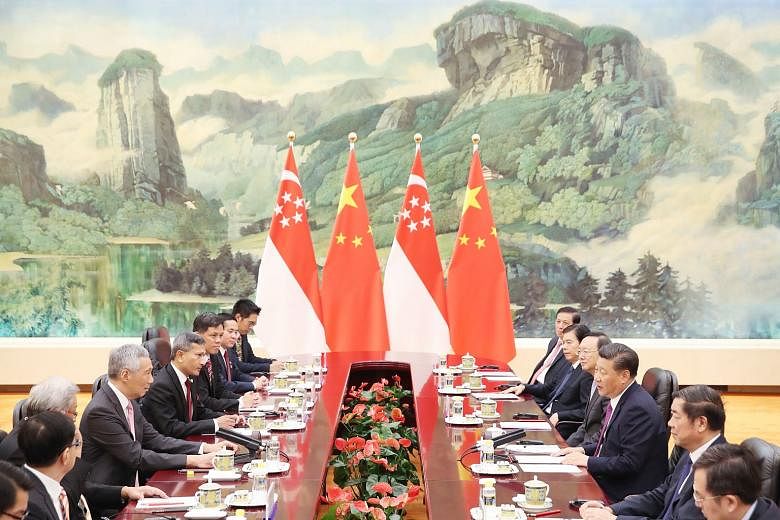China and Singapore share longstanding and broad-based bilateral relations. Singapore's founding prime minister Lee Kuan Yew visited China 33 times over 37 years, witnessing China's extraordinary progress.
Today, China is firmly entrenched in the era of the "Four Great New Inventions", namely the high-speed railway, e-commerce, mobile payment and the sharing economy. When Prime Minister Lee Hsien Loong visited China again recently, he must have had some different and impressive experiences.
In November 1978, Chinese leader Deng Xiaoping visited Singapore, marvelling over its great development achievements. A month later, the 3rd Plenary Session of the 11th Central Committee of the Chinese Communist Party was held, and China started its journey of historical reform and opening up. In 1992, during his famous "South China Tour Speech", Deng clearly stated that China must learn from Singapore and that it shall do better. China subsequently initiated a large-scale campaign of learning from Singapore.
Since then, Singapore has become one of the most important overseas training places for Chinese officials, with the most well-known training programmes offered by the Lee Kuan Yew School of Public Policy at the National University of Singapore and the Nanyang Centre for Public Administration at Nanyang Technological University. So far, nearly 50,000 Chinese officials of different levels have participated in study or training programmes in Singapore.
In his recent National Day Rally speech, PM Lee publicly praised China for leading the way to a "cashless society", which was so advanced that even Manpower Minister Lim Swee Say felt like a "suaku" (meaning country bumpkin in Hokkien). The self-deprecating joke was just a gentle reminder for Singapore, a tiny city state always possessed of a strong sense of crisis awareness or "kiasu" (scared to lose) attitude, to buck up in this area.
However, it does reflect the delicate shift in relative dynamics between the two nations. According to World Bank statistics, when China and Singapore established their formal diplomatic relations in 1990, China's gross domestic product was less than 10 times that of Singapore. But the number has quintupled to nearly 40 times, with China now the world's second-largest economy. The significant change in comparative power between China and Singapore will inevitably lead to some gradual modifications in the relative positioning of the two nations. Today, it seems that the two nations are learning from each other by sharing the experiences and challenges of economic and social governance.

On the one hand, China should continue to humbly learn from Singapore. As a sovereign and independent nation, Singapore is not a Chinese country, but it has a majority-Chinese population. Therefore, many of Singapore's governance practices are still most relevant to China, and it can remain as the "ideal role model" for China.
During my studies in Singapore , I was impressed by Singapore's unique bilingual and bicultural advantages. Singapore is very good at combining Western advanced concepts and technology with Eastern traditional culture and wisdom so as to localise institutions according to its own national conditions, such as the rule of law and the concept of "Asian values".
Nowadays, China's focal areas for learning from Singapore have gone far beyond economic development to mainly social governance, such as Singapore's advanced urban planning and environmental management, housing and social security system, state-owned enterprise management and anti-corruption system.
On the other hand, while China has the attitude of being able to learn from Singapore, I feel that some Singaporeans with a longstanding "sense of superiority" may be reluctant to learn from China, thinking of the country as an ever-lagging-behind "student".
While some Singaporeans have such views, I think Singapore's elite, those with business ties in China and those who travel frequently there or have kept up to date with developments, have become increasingly aware of the rapid growth in China, especially in the area of "Chinese innovations" such as mobile payment, the sharing economy and artificial intelligence. Among this group, there is a sense that Singapore has much to learn from China, and quickly.
Indeed, Singapore has a small population and its domestic market is small. Moreover, Singapore has a short history and its cultural resources are limited. These disadvantages may hinder its technological, business and cultural innovations. In comparison, underpinned by its huge market and long history, China is currently creating unprecedented momentum in innovation, which is worthy for Singapore to learn from.
As China advances, its soft power is also rising. Chinese-made movies and television shows are growing in popularity. Another positive sign is that more young Singaporeans are willing to actively participate in the Chinese variety show Sing! China.
In 1978, Mr Lee Kuan Yew told Deng: "Whatever we have done, you can do better because we are the descendants of the landless peasants of south China. You have the scholars, you have the scientists, you have the specialists. Whatever we do, you will do better." At that time, Deng did not respond. Today, China's own development miracle is the best reply.
Whether Singaporeans or Chinese nationals, all of us should remember: Being good at learning is a form of wisdom and talent, and being humble in learning speaks of grace and virtue.
- The writer is a China-born alumnus of the Lee Kuan Yew School of Public Policy at the National University of Singapore, where he was a student from 2008-2010. He is now an independent commentary writer based in Singapore, where he is a permanent resident. An earlier version of this article in Chinese appeared in the Lianhe Zaobao daily.

